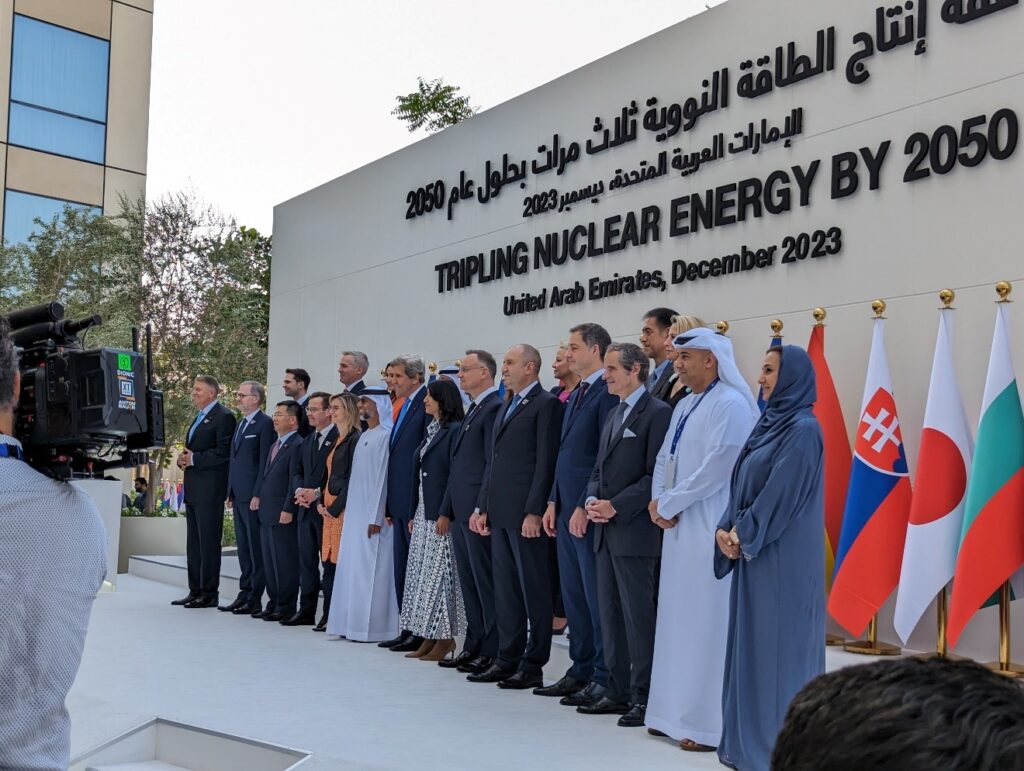The World Pledges to Triple Nuclear Power at COP28
Earlier this year, we wrote a post stating that “in 2022 the world acknowledged that net zero needs nuclear – in 2023 it will realize it needs a whole lot of it.” Well, as 2023 draws to a close, it has! This month at COP28 in Dubai, more than 20 countries[1] (some with operating nuclear and some with ambitions for nuclear) got together and pledged to triple the amount of nuclear power globally by 2050.

Why is this so important? For the first time at a COP meeting, there was a clear acknowledgement by governments that nuclear power is an essential part of the path to net zero. Of the countries represented at the announcement of the pledge were 8 presidents and several senior ministers, each who stood up and stated the importance of nuclear power to their countries’ net zero ambitions. This is a far cry from COP meetings as recently as 3 years ago where the nuclear advocates were not welcome within the government sanctioned blue zone (the blue zone is the area restricted to government authorized delegates while the green zone is open to the public).
This year at COP28, there were multiple booths within the blue zone focused on nuclear – including the IAEA, nuclear for climate, net zero nuclear and others . At each one of these there were events and panels discussing a variety of issues as they pertain to meeting this pledge. There was a high level of interest from attendees in learning more about this low carbon energy source.
This was followed up later in the week by a Net Zero Nuclear Industry Pledge from over 120 members of the nuclear energy industry agreeing to work towards at least a tripling of global nuclear capacity by 2050. We will discuss the importance of this industry commitment further in a future post.
As COP28 came to a close, more history was made in the official Global Stocktake – that the world must transition “away from fossil fuels in energy systems, in a just, orderly and equitable manner….so as to achieve net zero by 2050 in keeping with the science.” It then noted this should be achieved by “accelerating zero- and low-emission technologies, including, inter alia, renewables, nuclear, abatement and removal technologies such as carbon capture and utilization and storage, particularly in hard-to-abate sectors, and low-carbon hydrogen production.” This is the first time a COP has noted that fossil fuel use must be reduced and the first time nuclear is part of the solution.
Being in attendance at this historic event was a wonderous experience. After years of hard work by so many, we are seeing a strong government commitment to nuclear power as an essential part of the climate story. This commitment now sets the stage for government to follow up with policies to implement the pledge. The political climate for nuclear has never been better. After all, in 2022 the world acknowledged that net zero needs nuclear – in 2023 it fully accepted it needs a whole lot of it. Now begins the real challenge – delivering on this ambitious commitment.
[1] United States, Armenia, Bulgaria, Canada, Croatia, Czech Republic, Finland, France, Ghana, Hungary, Jamaica, Japan, Republic of Korea, Moldova, Mongolia, Morocco, Netherlands, Poland, Romania, Slovakia, Slovenia, Sweden, Ukraine, United Arab Emirates, and United Kingdom.